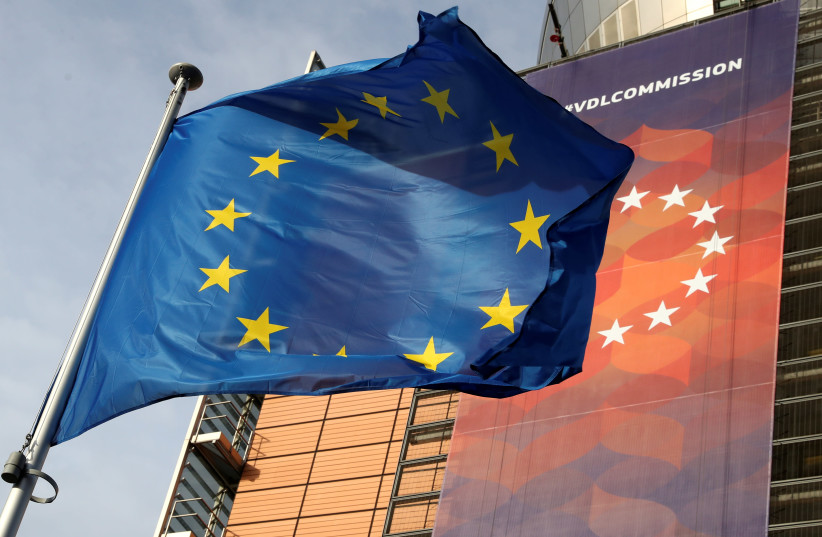 France, Britain, Germany trigger Iran nuclear deal dispute mechanism
France, Britain, Germany trigger Iran nuclear deal dispute mechanism
By REUTERS
The EU must now inform the other parties to the deal – Russia, China and Iran. If no resolution is found after 15 days, UN sanctions could be snapped back.

(photo credit: REUTERS/YVES HERMAN)
France, Britain and Germany confirmed on Tuesday that they had triggered the dispute mechanism in the Iran nuclear deal given Tehran’s ongoing violations of the 2015 agreement, but said they were not joining the United States campaign to exert maximum pressure on Tehran.
“We have therefore been left with no choice, given Iran’s actions, but to register today our concerns that Iran is not meeting its commitments under the JCPoA [Joint Comprehensive Plan of Action]] and to refer this matter to the Joint Commission under the Dispute Resolution Mechanism, as set out in paragraph 36 of the JCPoA [Iran deal],” the three European states said in a joint statement.
In one of the strongest calls yet from Europe for a new agreement to replace the 2015 deal that Washington abandoned two years ago, British Prime Minister Boris Johnson said earlier in the day that the way forward was to agree a new “Trump deal.”
A decision by Britain, France and Germany to trigger a dispute mechanism in the 2015 arms control agreement with Iran is not designed to re-impose U.N. sanctions but to bring Tehran back into compliance, the EU’s top diplomat said.
EU foreign policy chief Josep Borrell, who is also the chairman of the Iran nuclear deal that the EU helped to broker, told reporters he had received notification from London, Paris and Berlin of their decision to trigger the dispute resolution mechanism. He explained that the goal was to preserve the deal and not create a situation by which United Nations sanctions were reimposed on Iran.
The aim “is to resolve issues relating to the implementation of the Iran nuclear agreement (and not)… to re-impose sanctions,” Borrell said at the European Parliament in Strasbourg.
Washington’s European allies have tried to keep the nuclear agreement from collapsing since President Donald Trump pulled the United States out of it in 2018. Under the agreement, international sanctions against Iran were lifted in return for Tehran agreeing to curbs on its nuclear program.
But Washington has reimposed sanctions, denying Iran most of the economic benefits. Iran has responded by gradually exceeding many of the limitations it had signed up to in the deal. This month it said it would abandon limits on its production of enriched uranium, a step the Europeans said was likely to force them to respond.
On Tuesday the three European signatories to the deal Britain, France and Germany said they had triggered the mechanism to resolve disputes that had been written into the 2015 agreement.
Under the terms of the mechanism the EU must inform the other parties – Russia and China as well as Iran itself. There would then be 15 days to resolve the differences, a deadline which can be extended by consensus.
The process can ultimately lead to a “snapback” – the reimposition of sanctions in place under previous U.N. resolutions.
“At one point we have to show our credibility,” said one of the European diplomats. The second diplomat said: “Our intention is not to restore sanctions, but to resolve our differences through the very mechanism that was created in the deal.”
Washington’s exit from the nuclear pact, and the severe economic distress caused by the U.S. sanctions that followed, have fed one of the biggest escalations in hostility between the United States and Iran since Iran’s 1979 Islamic Revolution.
That has accelerated sharply since Jan. 3, when the United States killed the most powerful Iranian military commander, Qassem Soleimani, in a drone strike in Baghdad.
On Jan. 8, Iran accidentally shot down a Ukrainian airliner while its forces were on high alert following strikes on U.S. targets. After days of denials, the Iranian authorities acknowledged responsibility for the crash, and have since faced days of anti-government demonstrations at home.
Trump says his aim in quitting the nuclear deal was to force Iran to sign up to a more stringent pact. Tehran says it will not renegotiate as long as U.S. sanctions are in place.
Britain’s Johnson, a conservative who has pitched himself as an ally of Trump who can help bridge the diplomatic gap between the United States and Europe, said he wanted to avoid a military conflict with Iran.
“Let’s dial this thing down,” he said in an interview with the BBC.
On the deal, he said: “If we’re going to get rid of it, let’s replace it and let’s replace it with the Trump deal… President Trump is a great dealmaker, by his own account. Let’s work together to replace the JCPOA and get the Trump deal instead.”e. The aim was not to reimpose UN sanctions, the diplomats said.
Jerusalem Post Staff contributed to this report.
Zawartość publikowanych artykułów i materiałów nie reprezentuje poglądów ani opinii Reunion’68,
ani też webmastera Blogu Reunion’68, chyba ze jest to wyraźnie zaznaczone.
Twoje uwagi, linki, własne artykuły lub wiadomości prześlij na adres:
webmaster@reunion68.com
